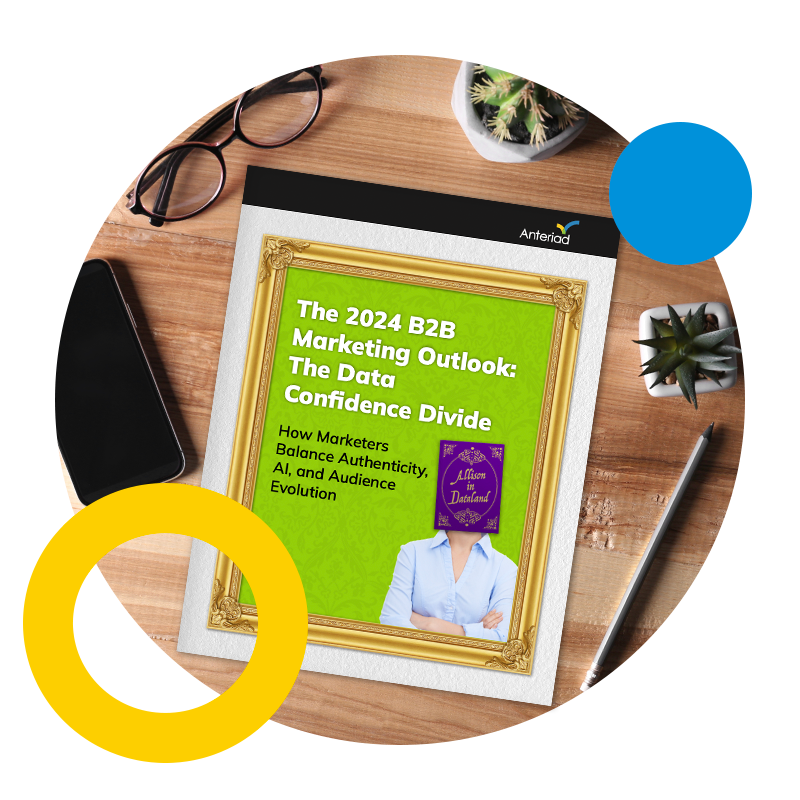Interview introduction
As B2B marketing continues to evolve rapidly, data-driven personalization has become paramount for connecting with audiences authentically. Foram Joshi, Director of Product Marketing at Evolve IP, shares valuable insights into leveraging data and personalization strategies to craft impactful marketing programs that genuinely resonate.
According to our research, companies like Evolve IP (sized 250-1000 employees) were 62% extremely confident in personalizing campaigns effectively, compared to bigger companies that fell to 49% confident.
Keep reading for the full interview conducted by Anteriad's research partner, Ascend2, to discover how this research is applied in marketers' day-to-day lives.
Embracing data-driven personalization
Understanding data holistically
For Foram, data is the cornerstone of effective marketing. She emphasizes the importance of seeing data holistically, understanding that it's constantly evolving, and using it to make informed decisions. Beyond merely collecting data in a CRM, Foram stresses the significance of engaging with customers directly through stakeholder interviews to uncover the reasons behind both wins and losses.
Building targeted audiences
One key strategy Foram employs is building look-alike lists based on collected data. She creates highly targeted audience segments by leveraging third-party data solutions and overlaying various data points such as ICP, buying committee, company size, industry vertical, revenue, etc. Intent data plays a crucial role in this process, assisting in list-building and serving as a valuable starting point for conversations.

Foram points to three programs that rely on leveraging data and personalization strategies to optimize performance.
How to put personalization into practice

Up-sell/Cross-sell
Contrary to assumptions, upselling existing clients isn't always straightforward and it always demands strategic targeting.
By identifying real contact points within the buying group and mapping multiple data sources such as client satisfaction score, customer’s IT budget, employee size, etc., Foram emphasizes the power of specific and targeted messaging tailored to the audience's needs.

Industry Specialization
In another example, Foram illustrates the effectiveness of targeting a specific industry and addressing industry-specific pain points with tailored solutions.
By employing various marketing channels and maintaining message consistency across platforms, she emphasizes the significance of tracking and attribution to measure program success accurately.

Identifying Trigger Events
Foram emphasizes the importance of determining an impending event that buyers care about to accelerate lead conversion.
Identifying the key pain point and buyer group followed by personalization of content and messaging increases the chances of driving quality leads. From creating industry-specific use cases and videos to developing personalized web pages and FAQ sheets, she stresses the need to deliver relevant content tailored to each audience segment.
Some common data points to leverage for personalization include:
- Demographic data
- Social media activity
- Purchase history
- Geographical and location data
- Behavioral data
- Interactions with content
- Technographic data
- Predictive analytics
- Intent data
- Communication preferences
- Lifecycle stage
As Foram indicates above, personalization is key to industry focused marketing and audience expansion. Those extremely confident in effective personalization are expanding by exploring new demographics or industries and expanding market segments at 63%. Those that weren’t so confident are only expanding at a lower rate (53%).
When putting personalization into practice, take a note from those doing it with ease.

Balancing authenticity and personalization
While leveraging AI tools like ChatGPT for idea generation, Foram counsels caution against over-reliance on AI by maintaining an authentic human touch when personalizing outreach. Anteriad research echoed this insight. When looking at those highly confident in personalizing campaigns effectively, we found:
1. Those highly confident in effective personalization are also the most concerned with brand authenticity in AI-driven marketing: 41% compared to 21%.
2. When creating brand messaging, these marketers consider authenticity to a greater extent: 72% compared to 58%.
3. They are also twice as likely to believe it is possible to perfectly balance maintaining brand authenticity with incorporating AI into GTM strategies.
From insights to future innovation
Looking ahead, Foram envisions predictive modeling enhancing personalization by anticipating customer needs and behavioral patterns with pinpoint accuracy. Investing in AI training will seamlessly integrate these capabilities into Evolve IP's marketing strategies.
Foram Joshi's authentic, data-driven approach empowers marketers to craft hyper-relevant experiences that command attention and drive meaningful engagement – fueling success for data-centric B2B brands everywhere.

The 2024 B2B Marketing Outlook: The Data Confidence Divide
Get your copy of the 2024 marketing report with insights from 429 B2B marketers on how they balance authenticity, AI, and audience evolution.
